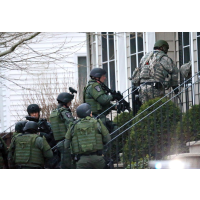New Rule Allows U.S. Military to Act without President’s Authorization
 (photo: Mark Garfinkel, Boston Herald)
(photo: Mark Garfinkel, Boston Herald)
In a major power grab of dubious constitutionality, the U.S. military last week claimed for itself the power to act unilaterally—without the authorization of the President—in case of “civil disturbances,” threatening a 200-year-old system that strictly forbids the military from becoming involved in civilian law enforcement. Seemingly innocuous in its brevity and simplicity, the new rule's chief danger lies in its vagueness:
Federal military commanders have the authority, in extraordinary emergency circumstances where prior authorization by the President is impossible and duly constituted local authorities are unable to control the situation, to engage temporarily in activities that are necessary to quell large-scale, unexpected civil disturbances. (italics added.)
The rule defines none of its key terms, which appear in italics above, raising questions of enormous import. A sergeant, for example, has command of soldiers in his or her squad—is the sergeant a “commander” under this rule? Even if the rule were restricted to those with the rank of Army colonel or above, there are more than 4,000 full-bird colonels in the Army. What is a “civil disturbance”? How large is “large-scale”? Where is the line between situations civilian authorities are able to control and those they are not? If elected officials believe a situation is under control, can the military commander countermand them and intervene with force anyway?
“These phrases don’t have any legal meaning,” argues Bruce Afran, a civil liberties attorney and constitutional law professor at Rutgers University, who calls the rule “a wanton power grab by the military…because it violates the long-standing presumption that the military is under civilian control.”
Drawing a chilling comparison to interwar Germany, Afran says the rule is “no different than the emergency powers clause in the Weimar constitution [that governed Germany from 1919 to 1933]. It’s a grant of emergency power to the military to rule over parts of the country at their own discretion.” Pointing to the lack of a clear definition of a civil disturbance, Afran notes, “In the Sixties all of the Vietnam protests would meet this description. We saw Kent State. This would legalize Kent State.” Or the brutal crackdowns on Occupy.
Rejecting Afran's view, a Pentagon official told the Long Island Press that “the authorization has been around over 100 years; it’s not a new authority. It’s been there but it hasn’t been exercised.” Despite these claims, the previously existing laws said by DoD to permit direct military participation in civilian law enforcement include obscure, century-old statutes like an 1882 law (16 USC § 593) empowering the President to use military force to protect “the timber of the United States in Florida” and the Guano Islands Act of 1856 permitting the President to use force to protect the rights of one who discovers a guano island covered by the Act.
The problem for the military is that both the Constitution and federal law are clear in their intent of keeping the military out of domestic affairs. Even the Declaration of Independence weighs in, criticizing King George III for trying “to render the military independent of and superior to the Civil Power.” The Constitution, in Article IV, bars the military from intervening in any state unless the state requests help because domestic violence threatens its “republican” government.
The Insurrection Act of 1807 limits the circumstances under which the president may use the military to suppress an insurrection, and the Posse Comitatus Act of 1878 prohibits the military from assisting civilian law enforcement except in circumstances “authorized by the Constitution or Act of Congress,” including “insurrection, domestic violence, or conspiracy that hinders the execution of State or Federal law” as well as actions “taken under express statutory authority.”
The trouble for the Pentagon is that there is no such “express statutory authority” for its sweeping new rule. As Eric Freedman, a constitutional law professor at Hofstra University, puts it, “The Department of Defense does not have the authority to grant itself by regulation any more authority than Congress has granted it by statute,” making the new rule “an unauthorized power grab,” according to Freedman. Given President Barack Obama's tacit support of the new rule, only Congress or the federal courts have the power to roll back or strike down the military's latest move.
-Matt Bewig
To Learn More:
DoD Issues Instructions on Military Support of Civilian Law Enforcement (Public Intelligence)
U.S. Military ‘Power Grab’ Goes Into Effect (by Jed Morey, Long Island Press)
Defense Support of Civilian Law Enforcement Agencies (Department of Defense, final rule) (Sec. 182.3)
- Top Stories
- Unusual News
- Where is the Money Going?
- Controversies
- U.S. and the World
- Appointments and Resignations
- Latest News
- What If China Invaded the United States?
- Donald Trump Has a Mental Health Problem and It Has a Name
- Trump Goes on Renaming Frenzy
- Trump Deports JD Vance and His Wife
- Trump Offers to Return Alaska to Russia






Comments